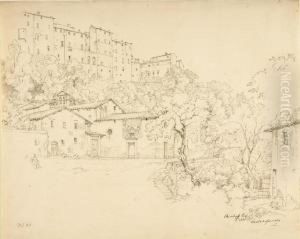Johann Christoph Rist Paintings
Johann Christoph Rist was a German poet, dramatist, and hymn-writer born on March 8, 1607, in Ottensen, in present-day Hamburg, Germany. Though he is not well-known as a visual artist, his cultural contributions during the 17th century in the fields of literature and hymnody were notable. Rist spent his early years in Hamburg, where he received a thorough education, first at the Gelehrtenschule des Johanneums and later at the Gymnasium Illustre.
Rist pursued higher education at the University of Rinteln, studying theology. In 1626, he became a tutor in Heide, and not long afterward, he participated as a soldier in the Thirty Years' War. His experiences during the war would later influence his writing. After his military service, he continued his studies at the University of Rostock, where he earned his master's degree in 1633.
Rist's career as a poet began in earnest when he settled in Wedel in 1635 as the pastor of the Johanniskirche. Here, he gained local fame as a writer of both secular and religious poetry, as well as dramas. His hymns are particularly significant, many of which are still sung today. 'Ermuntre dich, mein schwacher Geist' is one of his most famous hymns, and it showcases his ability to combine deep spirituality with the poetic language of the time.
In addition to his religious works, Rist wrote several plays and was involved in the intellectual and cultural circles of his time, which included various scholars, theologists, and writers. He was appointed as the poet laureate by Emperor Ferdinand III in 1644, which was a significant recognition of his work and influence.
Johann Christoph Rist died on August 31, 1667, in Wedel. His legacy endures primarily in the Lutheran tradition through his hymns, which continue to be an integral part of the hymnals and religious services. Rist's work, both poetic and dramatic, reflects the Baroque sensibility of his era, characterized by a rich interplay of religious fervor and a keen sense of the dramatic elements of human existence.

